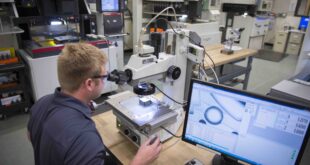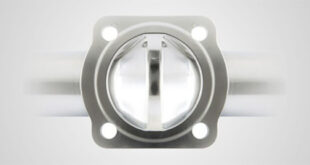 Alpha Manufacturing, one of the UK’s largest precision sheet metal fabricators, has ordered a TruBend Cell 7000 high-speed robotic bending cell and TruPunch 5000 CNC punching centre from TRUMPF.
Alpha Manufacturing, one of the UK’s largest precision sheet metal fabricators, has ordered a TruBend Cell 7000 high-speed robotic bending cell and TruPunch 5000 CNC punching centre from TRUMPF.
The £1 million investment complements the acquisition last year of a TRUMPF TruLaser 3030 fibre CNC laser profiling centre, and helps keep the company on track to achieve its ‘2020 Vision’ – a five-year plan to double turnover by 2020.
Established in 1989, Alpha Manufacturing is a privately-owned business and part of the Bri-Stor Group.
The 100+ employee company, which is based at a purpose-built 65,000ft² facility near Stafford, processes a wide range of materials in thicknesses from 0.5 to 25mm, from prototype quantities up to batch sizes of thousands.
Sectors served include construction, automotive, energy, lighting, electrical, security and medical, to list but a few.
“We have for some time admired the TruBend Cell 7000 from afar, but had resisted as all of our existing bending machines [press brakes] are from another supplier,” explains Operations Director Paul Clews. “However, with press brake skills becoming increasingly hard to source, we knew it made sense to look closely at more automated solutions. At first we considered press brakes with automatic tool changers, but these did not compare with the TruBend Cell 7000. In my opinion, there is nothing else like it on the market.”
Mr Clews and his team performed due diligence on the TruBend Cell 7000 and found the company would have no problem filling three shifts, 24-7, so the purchase decision was made. Installed in June 2017, the machine is now hard at work bending a multitude of different parts.
“In comparison with a standard press brake, we are achieving 30-40% more efficiency,” says Mr Clews. “However, it’s also about the skill set available on the machine. We now have complete peace-of-mind that no parts will be bent incorrectly. Such has been its impact that in 12 months we may look at taking another. Machines like the TruBend Cell form part of our long-term vision to deskill and automate.”
Six-axis back-gauging and a dynamic drive concept make the TruBend Cell 7000 the world’s fastest small-part (up to 500 x 380mm) bending cell.
Conveyor-based automation is matched with LoadMaster loading and automatic ToolMaster bend tooling set-ups to eliminate the need for operators.
Furthermore, consistent and precise angles are assured (without any manual intervention) thanks to TRUMPF’s tried-and-tested Automatically Controlled Bending (ACB) angle measuring system. Alpha has also taken delivery of TRUMPF’s TruTops Bend offline programming system.
While the TruBend Cell 7000 will operate on a stand-alone basis, the ultimate aim for the TruPunch 5000 is entirely different.
Last year, Alpha installed a STOPA automated materials handling and storage system, to which the company linked its new TRUMPF TruLaser 3030 fibre.
In the coming 18-months, Alpha intends to extend the STOPA by 5-10 bays, when it will be possible to fully integrate the TruPunch 5000.
For over three decades, STOPA and TRUMPF have been working together as partners. Due to this long-term co-operation, the organisational processes between the two companies – as well as the technical interfaces between STOPA storage systems and TRUMPF machines – are perfectly matched.
“The TruPunch 5000 replaces an automated machine from another supplier and gives us far greater capacity – I estimate that it is 100% quicker,” says Mr Clews.
TRUMPF’s TruPunch 5000’s backlash-free drives enable the highest axis acceleration, while the high rotational speed of the C axis enables extremely fast tapping, as well as the productive processing of complex contours.
It is possible to punch at up to 1,600 strokes per minute and mark parts at 2,800 strokes per minute
 Engineer News Network The ultimate online news and information resource for today’s engineer
Engineer News Network The ultimate online news and information resource for today’s engineer


